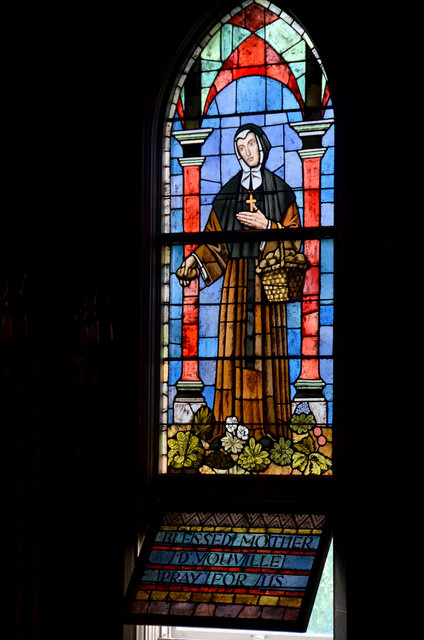- Education
- Becoming Catholic
- Alpha
- Bible Studies
-
The Saints
- St. Andrew
- St. Francis Xavier
- St. Lucy
- St. John of the Cross
- St. Andre Bessette
- St. Agnes
- St. Francis de Sales
- St. John Bosco
- St. Valentine
- St. Scholastica
- St. Polycarp
- Sts. Perpetua & Felicity
- St. Patrick
- St. Joseph
- St. Faustina
- St. Kateri Tekakwitha
- St. Catherine of Sienna
- St. Athanasius
- St. Dymphna
- St. Margaret Mary Alacoque
- St. Cyril of Jerusalem
- St. Marguerite d'Youville
- Sts. Peter & Paul, Apostles
- St. Benedict
- St. Bridget of Sweden
- Sts. Joachim & Anne
- St. Martha
- St. Dominic of the Rosary
- St. Anthony of Padua
- St. Augustine of Hippo
- St. Thomas Aquinas
- St. John Chrystostom
- St. Elizabeth Ann Seton
- St. Vincent de Paul
- Sts. Michael, Gabriel & Raphael, the archangels
- St. Francis of Assisi
- St. Teresa of Avila
- St. Luke
- St. Jude
- St. Gertrude the Great
- St. Martin de Porres
- St. Elizabeth of Hungary
- St. Cecilia

St. Marguerite d'Youville
Feast day: October 16
Patron: of widows, difficult marriages, death of young children
Birth: October 15, 1701
Death: December 23, 1771
Beatified: 1959 by Pope John XXIII
Canonized: December 9, 1990 by Pope John Paul II
Marie-Marguerite d’Youville was born in Quebec, Canada in 1701 and was the eldest of six children. After her father died when she was just seven, her family was driven to poverty. It was only through the support of her great-grandfather that she was able to attend the Ursuline convent in Quebec City at the age of 11 for two years. Upon her return home, she became an invaluable support to her mother and undertook the education of her brothers and sisters.
After marrying her husband François d'Youville at the age of 20, she soon came to realize that he had no interest in making a home life. A heavy drinker, he would often leave for long periods of time and deal in illegal trading. Even after all of this, when François became seriously ill, she faithfully cared for him, while pregnant, until his death. By age 29, she had experienced desperate poverty and suffered the loss of her father and husband and saw four of her six children die in infancy.
Once widowed, Marguerite dedicated herself to her religious renewal and she grew in her belief of God’s presence in her life. Wanting to pass that belief unto others, she undertook many charitable works; provided for the education of her two sons, who later became priests; and welcomed a homeless blind woman into her home.
Word had quickly spread of her charity and Marguerite was soon joined by three young women who shared her love and concern for the poor. In 1737, they consecrated themselves to God and promised to serve Him in the person of the poor. Marguerite, without even realizing it, had become the foundress of the Sisters of Charity of Montreal.
Providing a room for the poor, their actions went against the social conventions of the day, and d'Youville and her colleagues were mocked and made the object of ridicule by their friends and relatives. Many called them "les grises", which can mean "the grey women” as well as "the drunken women,” in reference to d'Youville's late husband.
At first the home only housed four or five members, but it grew as the women raised funds. A fire would later destroy this home, proving to only strengthen d’Youville’s commitment to her faith as she rebuilt it and continued in her work. After years of further pledging themselves to helping those in need, d’Youville soon earned the nickname "mother of the poor.”
In 1747, the General Hospital of Montreal was in ruins and debt and d’Youville was asked to become its director. She and her sisters were granted a charter to operate the hospital that they soon brought back into financial security. In 1765, a fire would destroy the hospital only to see d’Youville again turn to her faith and rebuild the hospital. After seeing their great work in the community, d’Youville and her followers were now being known as the "Grey Nuns of Montreal.”
She and her sisters rebuilt the hospital and cared for those in most desperate human misery. With the help of her sisters and their lay collaborators, Marguerite laid the foundation for service to the poor.
Marguerite died in 1771 after a life-long service to those in need. Pope John XXIII beatified Marguerite on May 3, 1959 and called her "Mother of Universal Charity" and she was then canonized in 1990. She is the first native-born Canadian to be elevated to sainthood by the Roman Catholic Church. Marguerite was one woman, but this daughter of the Church had a vision of caring for the poor that has spread far and wide.
| Thu | No Mass |
| Fri | 10:00am |
| Sat | No Mass |
| Sun | 11:00am |
| Mon | No Mass |
| Tue | 9:30am |
| Wed | No Mass |